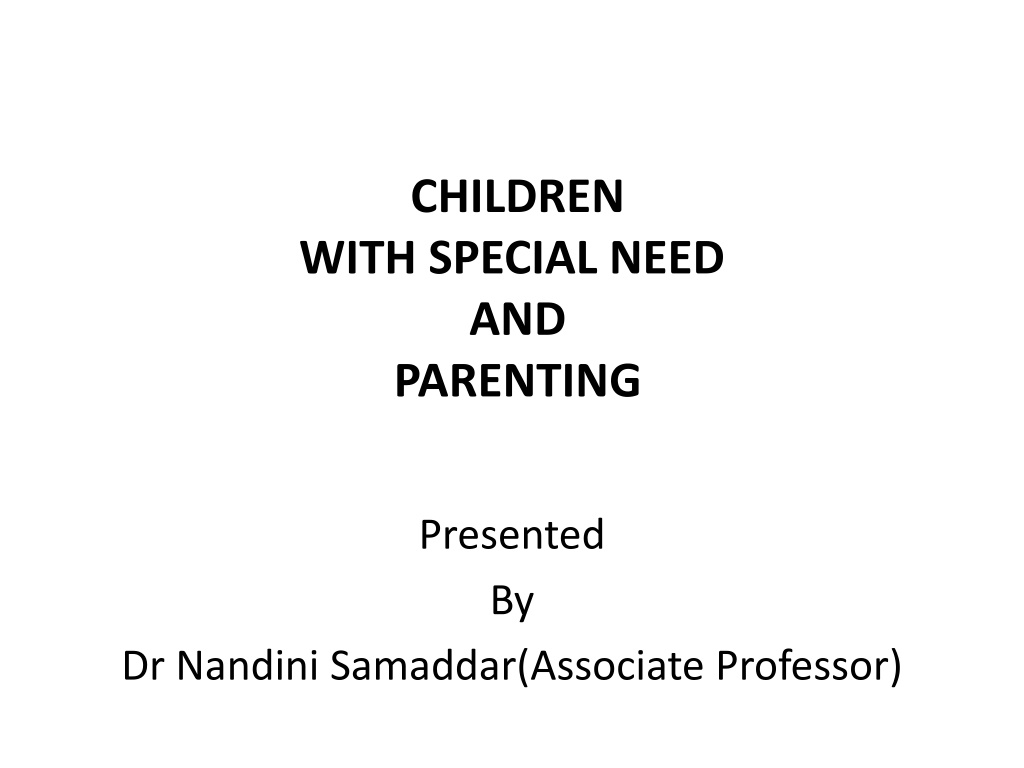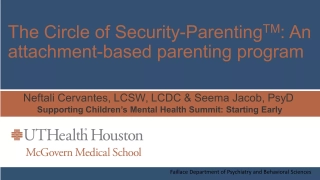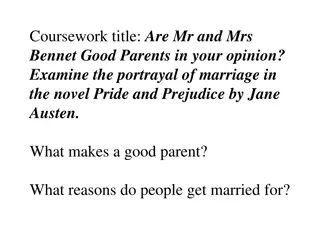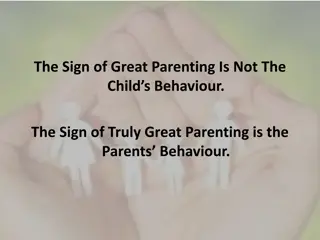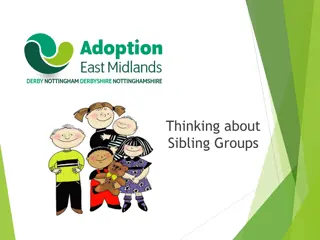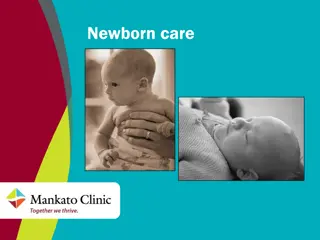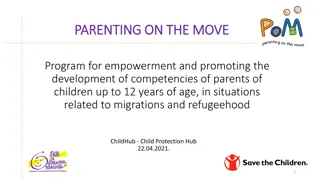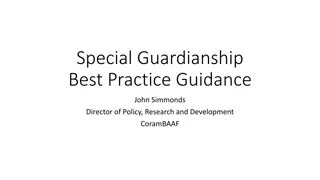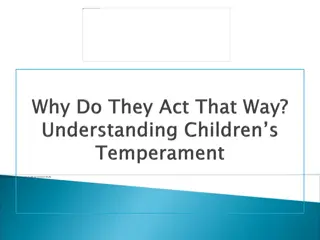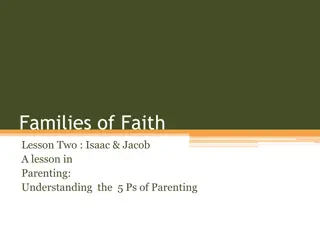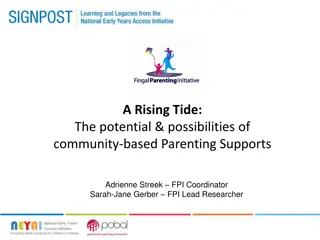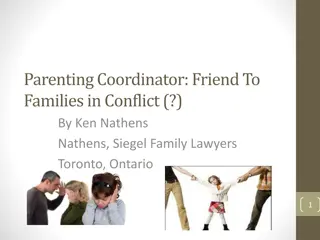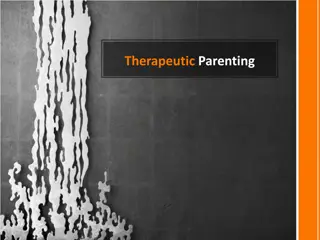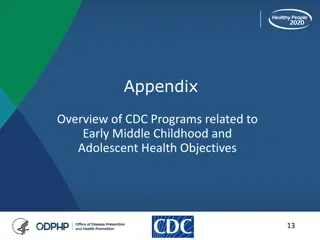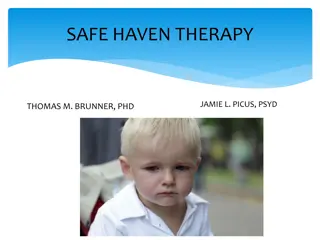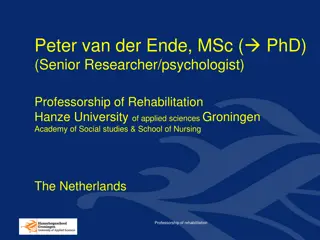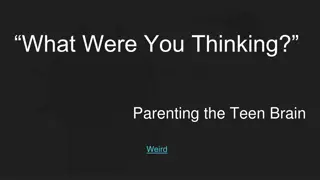Understanding Children with Special Needs and Parenting Challenges
Children with special needs deviate from the average in various aspects, requiring special provisions in education and adjustment. Categories include intellectually exceptional, sensory exceptional, orthopaedic impaired, socially or emotionally exceptional, communication disorder, learning or academically exceptional, and multiple exceptionalities such as ADHD and Autism. Specific conditions like learning disabilities, Cerebral Palsy, ADHD, and Autism present unique challenges that impact the child's development. Understanding the socio-psychological needs of these children is crucial, including the need for love, security, belongingness, social approval, and diverse life experiences.
Download Presentation

Please find below an Image/Link to download the presentation.
The content on the website is provided AS IS for your information and personal use only. It may not be sold, licensed, or shared on other websites without obtaining consent from the author. Download presentation by click this link. If you encounter any issues during the download, it is possible that the publisher has removed the file from their server.
E N D
Presentation Transcript
CHILDREN WITH SPECIAL NEED AND PARENTING Presented By Dr Nandini Samaddar(Associate Professor)
CONCEPT OF CHILDREN WITH SPECIAL NEED DEVIATION : Child s exceptionality in one or other aspects of personality. He/ She deviates seriously on the negative, positive and multiple sides on one or other aspects of the growth and development of their personality from the average children to the extent of requiring special provisions in terms of their education , adjustment and progress in life.
CATEGORIES OF SPECIAL NEED CHILDREN INTELLECTUALLY EXCEPTIONAL - gifted, creative, mentally retarded. SENSORY EXCEPTIONAL - visually and hearing impaired. ORTHOPAEDIC IMPAIRED SOCIALLY OR EMOTIONALLY EXCEPTIONAL- socially deprived, emotionally disturbed, delinquents COMMUNICATION DISORDER-affects ability to comprehend or apply language and speech to engage in discourse effectively with others. LEARNING OR ACADEMICALLY EXCEPTIOAL-learning disabled, slow learners MULTIPLE EXCEPTIONAL - Children with Cerebral Palsy, ADHD, Autism.
Learning disability- The academic performance of learning disabled may not match their IQ . Children may not be able to perform up to the expected standard in reading, writing and numeracy. LD includes a) Dyslexia(reading difficulty) b) Dysgraphia (writing difficulty) c) Dyscalculia(difficulty with numeracy) d) Dyspraxia(motor difficulty) Cerebral Palsy-it affects child s ability to move and to maintain posture and balance. ADHD-It is characterised by persistent pattern of inattentiveness, hyperactivity, forgetfulness, hyper impulsivity
Autism-childs disability to language and communicate, form social relationships and respond appropriately to the environment. Other abnormalities in their behaviour are-- a) Problem in eye contact. b)Repetitive and stereotype activities. c) Resistance to environmental change or change in daily routine. d) Hypo or hyper sensitivity. e) Problem in expressing sharing emotion f) Addiction to inanimate objects. g) Unusual use of play materials.
SOCIO-PSYCHOLOGICAL NEEDS Need to love and to be loved Need for feeling secure and safe Need for belongingness and social company Need for gaining and status, social approval and recognition Need for getting all experiences of life
PARENTING OF CHILDREN WITH SPECIAL NEED
PROBLEMS OF ACCEPTING A SPECIAL CHILD WHY IT HAPPENS WITH ME (PARENT)? COMPARISON WITH OTHER PARENTS & THEIR NORMAL CHILDREN. HOW CAN I (PARENT)PRESENT THE CHILD AS MY WARD BEFORE THE SOCIETY? HOW CAN THE WARD BE ABLE TO OVERCOME SHORTCOMINGS IN EVERY STAGE OF LIFE SINCE CHILDHOOD? HOW WILL THE WARD SURVIVE AFTER DEMISE OF PARENT?
TIPS FOR ATTITUDINAL CHANGES OF PARENTS FOR BETTER LIVING
Regarding individual difference we have nothing to do. Every one has some limitations. Acceptance the idea of Helen Keller :-Normal individuals are temporarily fit. Love the child and Accept him with all his abilities and disabilities Accepting philosophy of inclusion and mainstreaming for social progress. i. First consider one as human being. Then his abilities or disabilities. ii. Live and let live Accept the truth, do not hide, and try for early identification, consult with doctors, special educators, therapists. Join and form parental association. Right to spend life happily for both - parents and child. Hindrance of happiness is EGO.
Sublimate own ego. Do not judge or underestimate any one by his apparent behaviour Try to find out positive latent qualities Focus on abilities overlooking disabilities Eradicate the misconception of exceptionality as disease, rather it is a condition Try to Sensitize society. Consequently the special need child will be benefited with more safety, security and thus their self confidence will get a boost Different goals to be set according to particular case.
Do not think about ultimate goal :- Start with smaller time bound programme. Do not look upward Awareness about legal provisions and State incentives Parents should not banish themselves from the normal enjoyment of life. Rather they should try to grab all enjoyments of life along with the special child. Include the child in all normal activities and if necessary modify the situation according to his problem Research revealed problems of child will be aggravated when it has an emotional need clumped with it. Eg- Broken family or problem of neglecting by parents.
STRATEGIES FOR IMPROVEMENT NO 1 PROBLEM Low confidence level and withdrawn behaviour STRATEGIES They need whole hearted loud appreciation in each and every success in front of others. comparison with other pupil is strongly forbidden they need only supervision but not over protection Try to make them in self sufficient daily activities. They need attention to their physical fitness. Regular physical exercise is strongly recommended for them.
NO PROBLEM STRATEGIES Give instructions. One instruction at a time. Open ended question should not be given to them. questions with should be given Prompting (Verbal Gestural) are necessary. Small clues help them to communicate with others. 2 simple and specific Language and Communication Multiple less choice alternatives , Physical,
NO 3 PROBLEM Academic and cognitive field STRATEGIES Care should be taken so that minimal distraction is possible. For example while teaching close the door. The children who have the problem in gripping the pen they should be taught to use alternative devices like computer for the purpose of writing. Give less stress on memorization. Basic concepts should be taught transferred in real life situation. Different subjects should be correlated for better concept development
NO PROBLEM STRATEGIES Provide instructional aids for example calculators, fact tables. Spelling dictionaries. Multi-sensory teaching is the key to successful teaching to individuals with special need. Use concrete examples and demonstrations. Tasks must be modified according to their field of interest and abilities. Provide opportunities to progress at their own rate. Modify tests and evaluation measures to compensate for learning problems. 3 Academic and cognitive field
NO PROBLEM STRATEGIES socialisation Provide them ample opportunities to interact with different types of people in different situation. Provide enriched environment, merge more & more social interactive activities in their daily routine. They must be trained to act according to existing social norms. Create such situation so that the sense of give and take , rights and duties should be developed. 4
NO PROBLEM STRATEGIES Socialisation Do not segregate. If possible try to give them opportunity to inclusive education. Peer Assistance and Buddy System should be implemented in school activities. Helper peers should be appreciated and rewarded for their efforts. They should be treated as role model for other students. 4
NO PROBLEM STRATEGIES Sorting to be taught Pouring of water from one glass to other Folding of papers or clothing. Throwing and catching the ball. Walk with a ball Practice of backward walking Making garland by beads Fully filled up glass with water may be carried from one place to another. 5. Attention And Co-ordination
NO PROBLEM STRATEGIES Provide recreational activities according to their interest and choice and engage them accordingly Provide series of different types of activities and engage them with indoor and outdoor games so that brain is kept connected to the real world. 6. Expression of sexuality
NO PROBLEM STRATEGIES Adequate parental love and affection are needed and that should be expressed loudly. Create an environment which will not instigate sexual urge. Family members should try to give them value based education. 6 Expression of sexuality
CONCLUSION AND SUGGESTION Intervention technique for special need children should include following strategies : a) To follow individualized educational plan[IEP] b) Give more stress on functional academics c) Systematic task analysis and appropriate chaining are necessary d) Perfect collaboration between home and school is necessary. principles and
